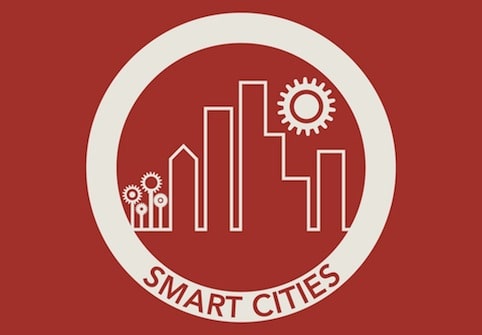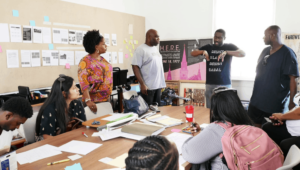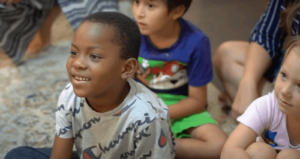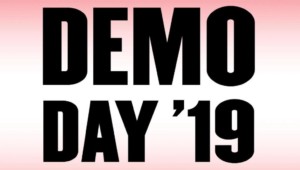Smart Cities: New Orleans

The first Maker Faire in New Orleans was held over the weened. It was hosted by a new school incubated by 4.0 Schools and New Schools New Orleans (NSNO)– Bricolage Academy. Matt Candler, founder of 4.0 Schools, said the event represents an important proof point that the New Orleans education story is about much more than recovery or making schools less bad than they once were, “Events like Mini Maker Faire prove that the future of school in New Orleans is a community effort – an effort by an entire city to invest in creativity, entrepreneurship, job creation in entire new industries, and the future of an entire city.”
As he watched hundreds of kids making robots, learning to code, and making jewelry, Chris Schultz, the founder of the city’s most vibrant coworking community, Launchpad, described the shift he sees, “This is so much bigger than the entrepreneurs at Launchpad right now. This is about the startups and companies these kids will start in the next 10, 20 years.” City leaders like Chris have made the connection between the academic success and creative potential of New Orleans’ kids and her long-term prosperity as a city. Mini Maker Faire, Bricolage, and dozens of other small-scale efforts across the city give him and others a tremendous sense of hope for the future.
End of failure. “Soon there will be zero failing schools in NOLA,” said Neerav Kingsland, CEO ofNSNO, in a November 2013 speech. The same could not be said for any other urban center in the country. The devastation of Hurricane Katrina in 2005 created an opportunity for the community to rethink the education system.
Over 90 percent of New Orleans public school students attend charter schools–the highest in the nation according to the Cowen Institute. The new system was designed around 3 principles: educator run schools, parent choice, and public oversight. A student of portfolio strategy, Kingsland calls NOLA an inverted system where “parents and educators have the most power.”
Of the 112 failing schools in Louisiana, only 9 are in New Orleans—and they will be improved or closed. Compared to the old system, the new schools in New Orleans have learning gains equivalent to 5 months of extra learning. New Orleans has nearly caught the state average in proficiency and college readiness and passed the state average graduation rate. African American students have gone from lowest performing in the state to 5 percentage points above the state average for African American students. That is “improved but not excellent,” said Kingland, “New Orleans needs 50,000 high quality seats to provide every child with an excellent education” and he estimated that they were half way there. (Kingsland announced he was leaving NSNO to help other cities to pursue New Orleans-style education reform. See his exit interview with Rick Hess)
Innovative schools. In 2008, Leslie Jacobs launched nonprofit Educate Now! to make reform effective and sustainable. In the last few years that meant supporting the growth of blended learning in New Orleans schools. In addition to assembling and coordinating $3 million in local funding to assist schools in exploring, planning for, and implementing blending learning models, Educate Now! supports programs to foster broad engagement including a Community of Practice for blended learning leads, and the New Orleans Blended Learning Fellowship for teachers interested in converting to a blended model.
With help from NSNO, Educate Now!, and national donors, there is new crop of innovative schools in New Orleans, including:
-
FirstLine Schools is network of 4 elementary and 1 high school. They were the first to adopt a blended model and their academic results have been great–they have lowered their operating cost while serving large numbers of special education students. CEO Jay Altman is excited about ST Math and adaptive learning i-Ready and Vmath, and the potential to “make teachers jobs a little more enjoyable.” (See Dell foundation sponsored FSG profile of Firstline.)
-
SciTech Academy is leading the personalized learning implementation for ReNEW Schools utilizing a lab rotation model in grades 3-4 and a 1:1 Chromebook rollout in grades 5-8. Students in grades 5-8 will carry their assigned Chromebook throughout the school day, learning through a mix of classroom-based and flex model instruction.
-
Sci Academy, the flagship school of the Collegiate Academies network, is piloting two blended learning programs programs: (1) a senior Seminar in Innovation and Change with 1:1 computer access that enables scholars to develop and apply collaboration, innovation, design, critical thinking, and presentation skills; and (2) a highly differentiated and therapeutic learning environment for students with severe emotional and behavioral needs.
-
KIPP McDonogh 15 Primary uses a rotational model in which students rotate between teacher-based instruction, technology-based instruction, and independent work throughout the school day. In each rotation, instruction is differentiated to meet individual student needs. KIPP Central City Academy is combining aspects of the rotational model, lab station model, and one-to-one computer access. Students participate in a personalized learning block and rotate onto computers in math class, have access to technology in ELA, Science, and Social Studies classes.
NSNO and 4.0 Schools, with the support of Khan Academy, launched the Future of School Challenge. The challenge is designed to bring to life a new generation of responsive, student-centered schools in New Orleans. Finalists in the Future of School Challenge will be given the time, space, and resources needed to make their vision a reality in the fall of 2016.
Backstory. New Orleans has long been a creative hotspot for music but not education. When I visited in the spring of 2005, the academic performance, the condition of school facilities, and the level of corruption were unbelievably bad.
Meeting edreformer Leslie Jacobs was the highlight of that trip. As a member of the State Board of Elementary and Secondary Education (BESE), Leslie was a primary architect of the Recovery School District (RSD), a statewide school improvement zone, in 2003. Leslie had some great allies including fellow BESE board member Paul Pastorek. Rudy Crew had created a similar takeover-zone in NYC two years before, but the RSD was the first aggressive state effort to address chronic failure. The RSD took over a failing school in the fall of 2004 and gained control over for four more in the spring of 2005. Jacob’s leadership turned out to be fortuitous.
Hurricanes Katrina ripped through New Orleans in August of 2005 devastating most school buildings and displacing many families. After the hurricanes, the state board, with the support of Governor Blanco and State Superintendent Cecil Picard, decided to place most of the Orleans public schools into the Recovery School District.
A few weeks after the hurricanes, Jim Shelton and I visited with Tulane president Scott Cowen who was charged with leading a committee to reform and rebuild the city’s failing public school system. Cowen, Picard, and city leaders were deep in triage efforts and making temporary education arrangements. In the midst of the chaos, Cowen asked how the education system could be redesigned for better performance. We described a portfolio approach (that we had written about in 2004) including high performing charter networks. Locals didn’t initially support the RSD takeover. The idea of a portfolio of operators also received mixed reception.
After the RSD takeover, Jacobs and her colleagues began recruiting partners and high-quality charter operators including KIPP which made an early commitment to being part of the new system (today they operate nine schools). The fact that BESE and the legislature addressed chronic failure, developed a solution, and built capacity pre-Katrina is a critically important to the educational success evident today.
Talent confluence. On a visit in 2007, I found the most amazing confluence of education talent ever assembled at a converted retail center purchased by Tulane and home of the Cowen Institute as well as Teach for America, New Leaders, TNTP, the Louisiana Association of Public Charter Schools, and NSNO. For local and recruited leaders that wanted to build a great network of schools, the converted mall at 200 Broadway was a turbocharged incubator.
In 2007 BESE selected Paul Pastorek as state superintendent. Pastorek, a bright and brave attorney and edreformer, turbocharged state and RSD efforts. He was the founding chair of Chiefs for Change and probably the best example thereof for the four years he served. Pastorek recruited Joel Klein’s deputy John White from NYC to run RSD. White followed Pastorek as State Superintendent in January 2012.
New Orleans is the best example of the difference that a focused talent development and recruitment strategy can make:
- Teach for America, directed by Kira Orange Jones, has 400 teachers and 830 alumni;
- New Leaders, directed by Adren Wilson, has trained 35 school leaders;
- TNTP recruits and trains teachers;
- Leading Educators, led by former SUNY authorizer Jonas Chartock, supports over 100 teacher-leaders in the midst of their two-year fellowships (as well as educators in Denver, Houston, Kansas City and Washington D.C.)
- Education Pioneers launched in NOLA in 2013 with 14 fellows under the leadership of Michael Richard and will place an additional 30 Fellows in 2014. Twenty-five EP alumni are currently working in education in Louisiana.
- In the summer of 2014, the innovative competency-based Relay GSE will enroll a cohort of New Orleans charter and district public school teachers.
EdTech. A Brookings report indicates that entrepreneurial activity in New Orleans is now 40 percent above the national average. Forbes said, “Assets such as low cost of living, high quality of life, and culture” have been essential in attracting and retaining the talent that has turned New Orleans into a tech hub.
NOLA entrepreneurs are supported by Abstraction Ventures, Voodoo Ventures, coworking space Launchpad, nonprofit incubators Idea Village and 4.0 Schools, and the New Orleans Startup Fund (where Leslie Jacobs is volunteer CEO). Three months ago, New Orleans established its own Angel Investor network and more than half of the deals they’ve considered so far are education startups. Jin-Soo Huh recently launched Ed Tech MeetUp: New Orleans–a recent meeting featured ST Math and LearnZillion.
Two of the most vibrant and well know EdTech startups were hatched at Idea Village and supported by the New Orleans Startup Fund: super gradebook Kickboard led by Jennifer Medbery; and recent winner of TechCrunch NOLA Tutti Dynamics, an online learning platform for music instruction.
Matt Candler is growing people that are growing educational solutions. His 4.0 Schools, is based on a process that most organizations start as an idea and go through a five-stage process: itch, hunch, test, launch, and scale. Matt and the team “live on the left side” turning hunches into testable products. They’ve supported a bunch of NOLA EdTech startups including:
- mSchool: makes personalized learning incredibly simple for schools.
- enrichED: helps schools hire great, part-time and substitute teachers.
- CultureConnect: a tool for museums and cultural institutions to build smartphone and tablet applications.
- Overgrad: students can track progress toward college admissions.
- Borne Digital: books that grow in difficulty as kids become better readers.
- Flummox and Friends: a smart, quirky show that equips students to talk about social and emotional challenges.
- TrueSchool: design studio for educators.
- imagiLabs: an educational game for kids, ChallengeBox, that blends digital learning with offline tinkering.
- Nomad Schools: individualized English language instruction for low-income students
- FantasyGeopolitics: social learning game that follows countries and world leaders as they compete for news headlines- fantasy league sports-style.
Some of the 23 ventures launched by 4.0 Schools are impacting other cities including Lead Prep Southeast, a 5-12 charter school in Nashville and Community Guilds and their STE(A)M Truck in Decatur Georgia.
Going digital. In the fall of 2011, families gained access to two full time virtual options including Louisiana Connections Academy and Louisiana Virtual Charter Academy. The state virtual school served up 9,179 part time course enrollments last year.
A Course Choice bill passed in 2012 (HB976) which allows students to take supplemental courses from approved providers with fractional funding following the student beginning in 2013. Students in schools graded C or below can take any course, while students in schools graded A or B can take courses for which their school offers no equivalent.
Assistant state superintendent Ken Bradford describes Course Choice program as part of the state’s effort to simultaneously improve college and career preparation. About a recent expansion of providers, Bradford said:
-
It includes job training providers reflecting the superintendent’s aggressive efforts to quickly and dramatically improve employability; and
-
It includes student support and special needs service providers like speech therapy provider PresenceLearning.
Another NOLA? Can the NOLA model be scaled or replicated? New Orleans schools spend about $10,000 per student, or just under the national average. On top of that they’ve raised about $100 million of philanthropy post Katrina.
Improvement of the last nine years has been a change in governance more than change in school models. Kingsland thinks other cities can copy the New Orleans model by replacing or transforming about 5 percent of schools every year—after 10 years that would be replace or update the lower performing half of the system.
Asked about the biggest mistake, Kingland said, “We didn’t think enough about networks early on.” (See recent post on the importance of networks to scaling quality).
There is not really a central office anymore. Now that there are so many charter schools, there are lots of questions about special education, admissions, discipline, and facilities being worked out as NOLA invents a system of schools. They have addressed enrollment with a common application (OneApp), discipline with a citywide standard, and long term building maintenance (proposed bill). The RSD and Orleans Parish School Board just signed a Cooperative Endeavor Agreement addressing special education, and services for truant and adjudicated youth.
A year ago Erika McConduit, Urban Leagues, said, “Parents are taking choice seriously.” A recent survey suggests that parents are 40 percent more likely to access educational options. However, Andre Perry, Loyola, said “there is a certain sameness to all the schools.” He argued for more diversity in options, particularly in career and technical education.
Perry and McConduit said it was time to do more to engage minority communities and get them more involved in school governance. Perry argued that despite big academic gains, the African American community has seen much in the way of economic gains.
Leslie Jacobs, argued, “There is 50 times more involvement with school governance than there was before Katrina,” largely a function of “350 local charter board members, representing every neighborhood and ethnicity and coming from very diverse backgrounds and experiences.” Jacobs and others noted how important the strong state accountability system was to creating the RSD and quality options. Caroline Romer Shirley and the Louisiana Association of Public Charter Schools were critically important in community engagement and charter school development.
Jacobs is worried about sustaining the continued academic growth. She believes the keys to NOLA 2.0 include 1) building human capital, 2) rigorous authorizing, and 3) continuing to innovate.
Can it be done elsewhere? The question may be, as Caroline Romer Shirley asked, “Can school boards reinvent themselves around portfolio?”
While the first decade post-Katrina was enabled by governance reform and powered by an amazing confluence of talent it looks like the second post-storm decade will be powered by the freedom of charter schools to innovate, a harbormaster like NSNO, and a thick web of support for edupreneurs. New Orleans will continue to be one of the best example of what’s possible in urban education.
For more see:
- Why We Need 4.0 Schools In Every City
- 4.0 Schools Will Offer Launch Program 3 Times a Year
- A Skunkworks for Schools
- 4 Frighteningly Ambitious Education Experiments for 2014
We’re updating all the Smart Cities posts and writing a book about learning ecosystems–you can help on both fronts.
Thanks to Leslie Jacobs, Neerav Kingsland and Matt Candler for help updated this post. MIND Research Institute and Presence Learning are Advocacy Partners. LearnZillion is a Learn Capital portfolio company.






0 Comments
Leave a Comment
Your email address will not be published. All fields are required.